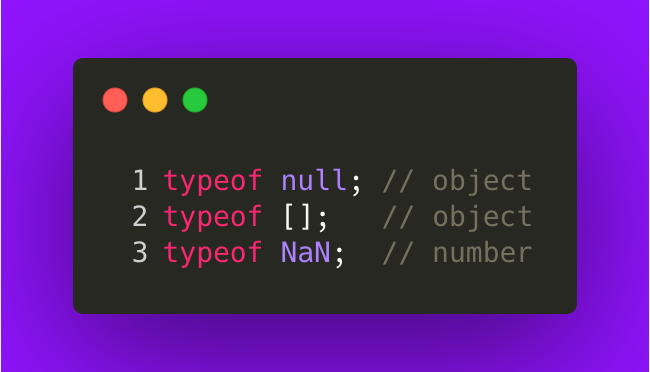
Articles
- JavaScript Double Equals vs. Triple Equals — Brandon Morelli done
- Should I use === or == equality comparison operator in JavaScript? — Panu Pitkamaki done
- == vs === JavaScript: Double Equals and Coercion — AJ Meyghani done
- Why Use the Triple-Equals Operator in JavaScript? — Louis Lazaris done
- What is the difference between == and === in JavaScript? — Craig Buckler done
- Why javascript's typeof always return "object"? — Stack Overflow list of ambiguous examples
- Checking Types in Javascript — Toby Ho done
- How to better check data types in JavaScript — Webbjocke done
- Checking for the Absence of a Value in JavaScript — Tomer Aberbach done
Checking Data type is not easy in Javascript.
== vs ===
==
- Operates loose equality
- Does type coercion
===
- Operates strict equality
- Both type and value have to be same to return
true
typeof vs instanceof
typeof
typeof returns object for all values except primitve type. (null is one exception.)
typeof([1,2,3]); // 'object'
typeof({}); // 'object'
typeof(1); // 'number'
typeof(null); // 'object'It is ueless to distinguish between different kinds of objects.
instanceof
It checks whether object is instance of certain type.
function Animal(){};
var a = new Animal();
console.log(a instanceof Animal); // true
console.log([1,2,3] instanceof Array); // trueWe can use constructor method to check the type.
console.log(a.constructor == Animal); // true
console.log([1,2,3].constructor = Array); // trueproblems of instanceof
-
Not walks up the prototype chain.
-
Error with primitve values.
console.log(3 instanceof Number); // false
console.log(true instanceof Boolean); // falseFor alternative, we can use constructor method for number, string, boolean type values. This works because, Javascript autoboxes given primitive type values with object wrapper. Precisely, it makes primitive value to object type, so this is why it works.
console.log((3).constructor == Number); // true
console.log('abc'.constructor == String); // trueSpinoff
Absence of a value
Undefined vs null
undefined represents the value that doesn't exists in compiler. Following situations returns undefined. undefined is not a literal , it is a property of global object.
-
unassgined variable
-
undeclared object property
-
default return value of function which doesn't returns
-
value using void operator
null however, represents the intentional absence of vaule. There is a bug with null using typeof method.
console.log(typeof null); // objectPerformance
-
strict equality is no slower than loose equality because they both check the operand types.
-
strict equality is faster than loose equality when types of operands differ.
-
of course, loose equality produces unexpected results.
